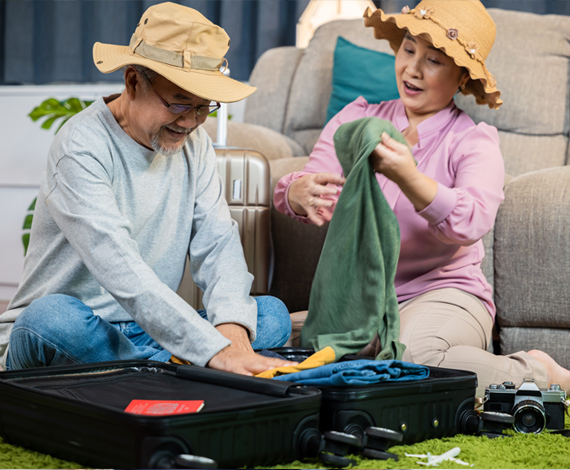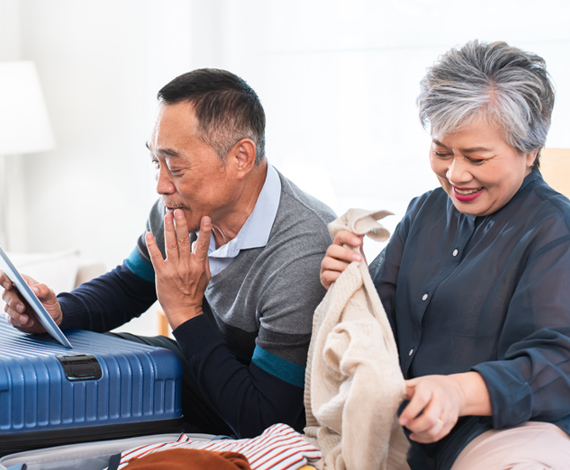Essential Packing Tips for Senior Travelers

Essential Packing Tips for Senior Travelers
Of all the great pleasures in life, travel is one thing enjoyed by many seniors for various reasons, such as spending time with family and friends, seeing new sights, among others. With increased age, needs and preferences change, and packing for a vacation may be an overwhelming or frustrating experience. Packing thoughtfully is essential in making travel comfortable and stress-free. In this blog, we will focus on some of the essential packing tips for comfort, convenience, and preparedness that every senior traveler should know.
Detailed Packing List
Before embarking on packing, one must make a detailed list of what they shall want for the whole journey. A packing list helps in organizing and ensuring you do not leave important things behind. Kick it off with all your essentials: medications, important documents, personal care items, clothes, electronic gadgets, and any other specifications of destination or activity. Categorizing your list into things like medications, documents, clothing, personal care items, and electronics will make the chore of packing easier to approach. A detailed list will also be helpful for when you may have to repack everything, at the end of your trip, to head home, to make sure nothing gets left behind.
Ease and Comfort Above All
Comfort and ease should be the utmost concern when packing for a senior traveler. Sufficiently lightweight, breathable, easily layered clothing provides a base that will help you acclimate to the changing ambient air temperatures or extreme weather conditions. Comfortable shoes are important, too, if you have to do a lot of walking or standing. A good supportive shoe that is easy to slip on and off is a good choice. Packing versatile items of clothing that can be mixed and matched for various outfits can minimize the amount you need to pack. In addition, a few handy, travel-friendly accessories, such as a travel pillow, an eye mask, earplugs, and a light blanket or shawl, can make hours much more bearable on an airplane or bus.


Pack Medications and Health Supplies
For senior travelers, packing medicine and health supplies is number one. This will ensure that your medications are always easy to access and safe, but most importantly, you won't be without any medications if your checked luggage gets lost. Always keep medications in their original, labelled packaging, as this can be very important for customs-especially when traveling outside of the country. Bring enough medication for the duration of your trip, plus several extra days in case of delays. It's also a good idea to bring along a copy of your prescriptions and a doctor's note detailing your medical needs-especially in the case that you have syringes or other equipment with you. Besides medications you normally take, think about preparing a little first-aid kit with basic things like sticky band-aids, wipes, pain relievers, and whatever over-the-counter medicines you may want or need.
Pack Important Documents and Make Copies
Well, there are just some very vital documents you need to travel with, and it is very critical that such documents be kept in a neat and accessible way. Store your passport, ID, insurance documents for traveling, itinerary, and other vital papers in one safe, easily accessible place, like in some travel wallet or document organizer. To further protect oneself from loss and theft, photocopies of vital documents should be made and kept separately from the originals. You may also want to keep digital copies on your mobile phone or in the cloud for convenience.
Consider Special Needs of Your Destination
You must also consider special needs once you arrive at your destination. In case your destination is a tropical region, for instance, you absolutely don't want to leave without sunscreen and insect repellents. If the water in your destination isn't safe to drink, you may want to bring along with you a portable water purifier or water purification tablets. Research the weather of the place you are visiting and the local culture. This will help to guide you on what clothes to bring with you and other equipment. If you have difficulty in walking, or you need special attention, keep this in mind when packing and bring with you a traveling cane, portable wheelchair, and other things that can help you move comfortably, and book in advance for any accommodations you may need.
Use Aids for Packing and Organizers
Use aids such as packing cubes and compression bags in your packing to create more space and to keep your luggage organized. Packing cubes are really great for keeping all your underwear and other soft things properly inside your suitcase, therefore making access to any particular thing quite easy without having to unpack everything. You can have different cubes for underwear, shirts, or even accessories. Compression bags come in real handy for reducing the volume of bulky items like jackets and sweaters. This way, you'll be able to fit more stuff in your suitcase without exceeding the weight limit.
Pack Light and Smart
When packing, it is always good to pack light. Overpacking leads to heavy, cumbersome luggage that might be difficult to handle, especially for senior travelers. The best method of packing is to include in your luggage only those items that you will be using and which cannot readily be bought at your destination. Do not pack items "just in case" unless they are critical for your comfort or health. Choosing lightweight, durable luggage can make all the difference. Consider investing in a suitcase with wheels and a comfortable handle to better maneuver through airports, hotels, and city streets.
Packing for a trip does not necessarily have to be an overwhelming experience for a senior traveler. Just follow these few tips, plan ahead, and this will almost guarantee a smooth, comfortable, and enjoyable journey. Remember and make sure it's comfortable and convenient, try a packing list to get yourself organized, and plan ahead for particular needs of your destination. By the time you've done all this, you'll be just fine and ready to take full pleasure in your travels, making the most of your adventure.